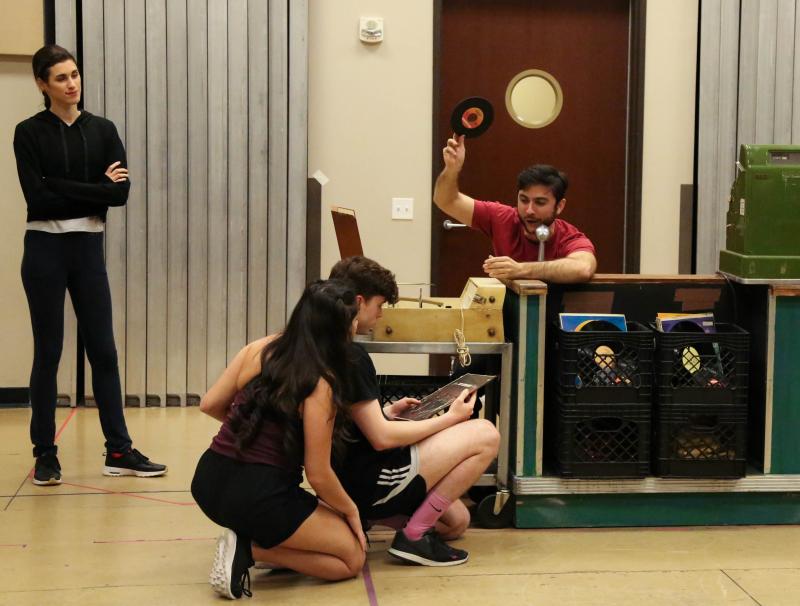Interview: Barrett Riggins on Rockin' and Rollin' in MEMPHIS

The multi-talented Barrett Riggins is soon to grace the Theatre Under the Stars stage as a fast-talking 1950s DJ who tilts the world off its axis when he dares to desegregate his airwaves in the Tony Award-winning musical MEMPHIS. But first, Riggins joins Broadway World to talk about the "quintessential American musical"; "Daddy-O Dewey," the real-life inspiration behind his character, Huey Calhoun; and the power of music to open hearts and minds.
Let's start by meeting your character -- and what a character he is! -- Huey Calhoun. If you were about to introduce Huey to a group of friends, how would you describe him? Better yet, what kind of warning would you give them?
Barrett Riggins: At the beginning of our show, Huey is just this floundering motormouth who lives with his mother and can't hold a job, but through total moxie and his passion for early R&B "race music," Huey becomes a revolutionary disk jockey and the most popular man in Memphis. I think the major appeal of this musical is getting to experience both Huey's ascent in popularity alongside the rise of Beale Street's rock and roll scene, at a time in our history where racial tensions in a place like Memphis seemed insurmountable.
Huey is a fictionalized version of Dewey Phillips, a Memphis DJ who played music from both black and white artists on his radio show - a pretty big deal in the South during the 1950s. How does having a real-life reference help in developing your character? Since it is a fictionalized version, what kind of freedom do you have to make it your own?
Barrett Riggins: Dewey Phillips was a riot! Whenever you bring to life a real person from history, there is a kind of added responsibility for the actor to honor the life and spirit of that person. And luckily for me, there are lots of archival recordings of Dewey's hilarious rambling broadcasts as well as numerous books written about him that have been very helpful leading up to rehearsals. However, at the end of the day, I do have to remember that it's not Dewey, but Huey that I'm portraying. While any and all Dewey research is certainly informative, it's Joe DiPietro's script that is paramount.
A key moment in Huey's journey will be during your performance of "Memphis Lives in Me." What is it about that number that makes "Memphis Lives in Me," and that moment, so effective?
Barrett Riggins: When Huey sings "Memphis Lives In Me" he's at this huge fork in the road. Uncompromising in his feelings for Felicia and his commitment to championing rock and roll, his success finally reaches a breaking point and he has to choose between his home and the love of his life. It's really heartbreaking because at this point the audience has spent almost two hours with Huey, and they completely understand just how hard a decision this is for him. The number begins as a sort of resignation, but it turns into this beautiful anthem by the end that I think will really move Houston audiences.
MEMPHIS itself has gone on quite the journey since making its world premiere (in a much different form) in 2003 and then opening on Broadway in 2009. Do you remember the first time you encountered MEMPHIS? What was your first impression?

Barrett Riggins: I grew up in Northern California about an hour outside San Francisco, so I didn't get a chance to see the original Broadway cast of MEMPHIS. For years, though, I've had teachers and mentors telling me that I should play this role someday, so the show has definitely been on my radar since its premiere back in 2010. It's really exciting to finally play such an eccentric oddball who just happens to be the leading man in this story.
The musical has had such a successful run - including picking up a couple of Tony Awards, including the Tony for best musical, of course. Why do you think it resonates so strongly with audiences?
Barrett Riggins: I think MEMPHIS is a quintessential American musical. It's got an incredible score, a moving story about a critical time in our history, romance, humor, scandal -- what's not to like?
Now a little about you! I know that you graduated from the University of Michigan with a BFA in Musical Theatre this past May. How did your training prepare you for the reality of working in musical theatre?
Barrett Riggins: Huey is shot out of a cannon at the beginning of Act One and is onstage singing, scheming, and shouting for almost the entirety of the show. At Michigan, a lot of the training centered around the idea of extensive preparation leading up to a sort of surrender - this idea that once you've been shot out of that cannon, all you can do is trust that you've put in the work controlling all the variables that you can control, and that your technique and craft will help you handle all of the variables you can't control. I'm really looking forward to trying to find that surrender onstage while playing this guy who was infamous for his spontaneity and unpredictability.
MEMPHIS muses on the power of music to unite people. As someone who is not only musical theatre-trained, but also a songwriter and musician, what do you think music has the power to do?
Barrett Riggins: As the characters in MEMPHIS discover, music is such an effective tool towards unity as it transcends language and rational thought. Even if a lyric appears simple, music inherently both complicates and clarifies. I find that I'm typically drawn to songs that are difficult to summarize, and I'm only inspired to write songs that explore what language on its own cannot. A song like "Memphis Lives In Me" on paper may be rather simple, but the emotional life of Huey at that point in the show is extremely complicated and therefore reflected in the piano accompaniment and melody of the song. A lyric like "all I know is Memphis lives in me" is only truly illuminated when it's packaged with David Bryan's beautiful score.
And finally, what is the best advice anyone has ever given you?
Barrett Riggins: A life in the theatre can be very ephemeral and sometimes you blink during the first rehearsal and you're suddenly at closing night. So I've been encouraged again and again by actors older and wiser than me to step back whenever you can and find moments to appreciate the process. This production and this cast is a very special one, so I'm going to try my hardest to appreciate it every step along the way.
Check out Barrett Riggins in MEMPHIS, running February 20 through March 4 at The Hobby Center for the Performing Arts, 800 Bagby. For more information, call 713-315-2525 or visit tuts.com. $30 to $123.
And for more information on Barrett, please visit his website at barrettriggins.com.
Comments

Videos
